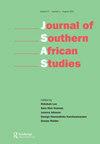African Resistance to the 1887 Parliamentary Voters’ Registration Act
IF 0.7
4区 社会学
Q2 AREA STUDIES
引用次数: 0
Abstract
Pressure in the Cape Colony parliament for disfranchising policies was primarily instigated by the Afrikaner Bond. The Bond’s initiatives were based on prejudice against Africans and amounted to an attempt at weakening the influence of English-speaking politicians with the belief that many of them were in parliament because Africans voted for them. An attempt was made through the Parliamentary Voters’ Registration Act of 1887, which implicitly imposed a racial qualification based on the premise that most Africans occupied land communally, and therefore communal tenure was excluded as a qualification for the franchise. This article illustrates the fact that, although Africans did not initially take up the opportunity to participate in the franchise en masse, political participation by the 1880 s was deeply valued by the growing number of Africans who actively participated in the franchise. This is demonstrated by the different attempts made by literate and better-off Africans to remain on the voter registration lists. Through the examination of articles and reports on the experiences and opinions of Africans that were published in the press, African resistance to the passage and implementation of the 1887 Parliamentary Voters’ Registration Act is illuminated through examples of their efforts to register as voters, to mobilise in defence of African interests and to participate in Cape Colony politics through the vote.非洲人对1887年议会选民登记法的抵制
开普殖民地议会对剥夺选举权政策的压力主要是由阿非利卡债券煽动的。邦德的举措是基于对非洲人的偏见,相当于试图削弱讲英语的政客的影响力,因为他们相信他们中的许多人在议会中是因为非洲人投票支持他们。通过1887年的《议会选民登记法》进行了一次尝试,该法隐含地规定了一种种族资格,其前提是大多数非洲人以社区形式占有土地,因此社区保有权被排除在外,作为选举权的资格。这篇文章说明了一个事实,即尽管非洲人最初没有机会集体参与选举,但到1880年,政治参与 s深受越来越多积极参与特许经营的非洲人的重视。识字和富裕的非洲人为继续留在选民登记名单上所做的不同努力证明了这一点。通过审查新闻界发表的关于非洲人的经历和意见的文章和报告,非洲对通过和实施1887年《议会选民登记法》的抵制通过了他们努力登记为选民的例子,动员起来捍卫非洲的利益,并通过投票参与开普殖民地的政治。
本文章由计算机程序翻译,如有差异,请以英文原文为准。
求助全文
约1分钟内获得全文
求助全文
来源期刊

Journal of Southern African Studies
AREA STUDIES-
CiteScore
1.40
自引率
0.00%
发文量
73
期刊介绍:
The Journal of Southern African Studies is an international publication for work of high academic quality on issues of interest and concern in the region of Southern Africa. It aims at generating fresh scholarly enquiry and rigorous exposition in the many different disciplines of the social sciences and humanities, and periodically organises and supports conferences to this end, sometimes in the region. It seeks to encourage inter-disciplinary analysis, strong comparative perspectives and research that reflects new theoretical or methodological approaches. An active advisory board and an editor based in the region demonstrate our close ties with scholars there and our commitment to promoting research in the region.
 求助内容:
求助内容: 应助结果提醒方式:
应助结果提醒方式:


